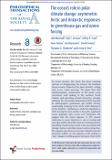The ocean's role in polar climate change: asymmetric Arctic and Antarctic responses to greenhouse gas and ozone forcing
Author(s)
Kostov, Yavor Krasimirov; Hausmann, Ute; Ferreira, David; Shepherd, Theodore G.; Bitz, Cecilia M.; Marshall, John C; Armour, Kyle; Scott, Jeremy; ... Show more Show less
DownloadMarshall_The ocean's role.pdf (1.151Mb)
PUBLISHER_CC
Publisher with Creative Commons License
Creative Commons Attribution
Terms of use
Metadata
Show full item recordAbstract
In recent decades, the Arctic has been warming and sea ice disappearing. By contrast, the Southern Ocean around Antarctica has been (mainly) cooling and sea-ice extent growing. We argue here that interhemispheric asymmetries in the mean ocean circulation, with sinking in the northern North Atlantic and upwelling around Antarctica, strongly influence the sea-surface temperature (SST) response to anthropogenic greenhouse gas (GHG) forcing, accelerating warming in the Arctic while delaying it in the Antarctic. Furthermore, while the amplitude of GHG forcing has been similar at the poles, significant ozone depletion only occurs over Antarctica. We suggest that the initial response of SST around Antarctica to ozone depletion is one of cooling and only later adds to the GHG-induced warming trend as upwelling of sub-surface warm water associated with stronger surface westerlies impacts surface properties. We organize our discussion around ‘climate response functions’ (CRFs), i.e. the response of the climate to ‘step’ changes in anthropogenic forcing in which GHG and/or ozone-hole forcing is abruptly turned on and the transient response of the climate revealed and studied. Convolutions of known or postulated GHG and ozone-hole forcing functions with their respective CRFs then yield the transient forced SST response (implied by linear response theory), providing a context for discussion of the differing warming/cooling trends in the Arctic and Antarctic. We speculate that the period through which we are now passing may be one in which the delayed warming of SST associated with GHG forcing around Antarctica is largely cancelled by the cooling effects associated with the ozone hole. By mid-century, however, ozone-hole effects may instead be adding to GHG warming around Antarctica but with diminished amplitude as the ozone hole heals. The Arctic, meanwhile, responding to GHG forcing but in a manner amplified by ocean heat transport, may continue to warm at an accelerating rate.
Date issued
2014-06Department
Massachusetts Institute of Technology. Center for Global Change Science; Massachusetts Institute of Technology. Department of Earth, Atmospheric, and Planetary SciencesJournal
Philosophical Transactions of the Royal Society A: Mathematical, Physical and Engineering Sciences
Publisher
Royal Society
Citation
Marshall, J., K. C. Armour, J. R. Scott, Y. Kostov, U. Hausmann, D. Ferreira, T. G. Shepherd, and C. M. Bitz. “The Ocean’s Role in Polar Climate Change: Asymmetric Arctic and Antarctic Responses to Greenhouse Gas and Ozone Forcing.” Philosophical Transactions of the Royal Society A: Mathematical, Physical and Engineering Sciences 372, no. 2019 (June 2, 2014): 20130040–20130040.
Version: Final published version
ISSN
1364-503X
1471-2962